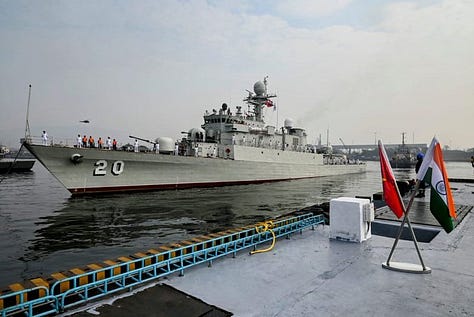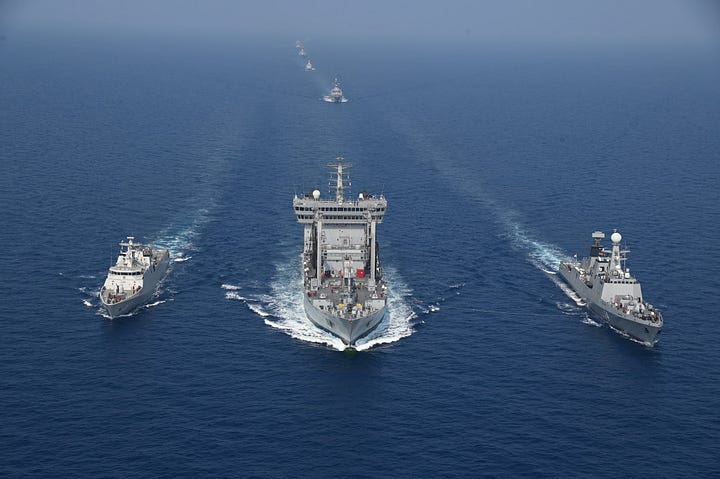Navigating the Tides of Multilateral Diplomacy: A Deep Dive into "Milan 2024"
"Milan 2024", a complex naval exercise where strategic adversaries collaborate at sea to enhance cooperation, strengthen security, and address modern maritime challenges with diplomacy and teamwork.
In a display of naval grandeur that defies geopolitical rifts, the waves of the Indian Ocean part to welcome an unlikely alliance – “Milan 2024” beckons nations both ally and adversary, united by the clarion call of maritime cooperation. This biennial maritime extravaganza, hosted by India, promises to be a spectacle of naval prowess and diplomatic finesse, transcending boundaries and fostering camaraderie among nations.
At the heart of “Milan 2024” lies a profound message: the oceans unite, they do not divide. This sentiment echoes the age-old adage that maritime nations share a common destiny, bound by the vast expanse of the seas. As the participants converge in the picturesque city of Visakhapatnam, they embark on a journey that goes beyond mere naval drills and maneuvers.
The exercise's central aim is to enhance professional interaction between friendly navies, fostering an exchange of ideas, strategies, and best practices. It serves as a platform for collective brainstorming, addressing maritime subjects of common interest, and seeking solutions to shared challenges. This collaborative approach underscores the recognition that global security and prosperity are intrinsically intertwined, transcending borders and ideologies.
But “Milan 2024” is not merely a gathering of like-minded nations; it is a testament to India's diplomatic clout and strategic relevance on the global stage. The participation of rival powers such as the United States, Russia, and Iran is a testament to New Delhi's growing influence and its ability to bring together disparate actors under the banner of collective security. This feat not only showcases India's diplomatic dexterity but also highlights its commitment to multipolarity and its vision of "SAGAR" – Security and Growth for All in the Region.
The exercise's scope extends far beyond the confines of maritime operations. It encompasses a multitude of activities, from cultural exchanges and city parades to sports championships and social interactions. These events serve as a bridge, connecting diverse cultures and fostering a deeper understanding and appreciation for one another's heritage and traditions.
Moreover, Milan 2024 underscores the importance of collective preparedness in the face of emerging threats. With the ongoing turmoil along the Red Sea and the destabilization of the Indo-Mediterranean routes, the exercise provides a platform for participating nations to hone their skills and refine their operational strategies. Through seamanship evolutions, weapon firings, anti-submarine warfare exercises, and tactical maneuvers, the navies of the world come together, united in their commitment to maintaining maritime security and safeguarding global trade routes.
As the world grapples with the complexities of the 21st century, exercises like “Milan 2024” serve as a reminder of the power of cooperation and the potential for collective action. They represent a concerted effort to transcend divisions and forge bonds of trust and understanding, paving the way for a more secure and prosperous future.





Yet, amidst the celebration of multilateralism and diplomatic triumph, one cannot ignore the underlying tensions and divisions that persist among the participating nations. The presence of rival powers such as the United States, Russia, and Iran underscores the delicate balance that must be struck between cooperation and competition, between shared interests and divergent ideologies.
As we look ahead, several thought-provoking questions arise:
Can exercises like “Milan 2024” catalyze broader diplomatic breakthroughs, fostering dialogue and reconciliation among nations mired in conflict?
Can the spirit of camaraderie and collaboration fostered during these events translate into tangible progress on pressing global issues, such as international terrorism, cybersecurity, and human rights?
And perhaps most importantly, can the lessons learned and the bonds forged during “Milan 2024” endure, strengthening the foundations of global peace and stability?
These questions invite us to engage in further discourse, to share our perspectives and experiences, and to contemplate the role of multilateral exercises in shaping the future of international relations. It is through open and honest dialogue that we can navigate the tides of diplomacy, charting a course toward a more secure and interconnected world.





